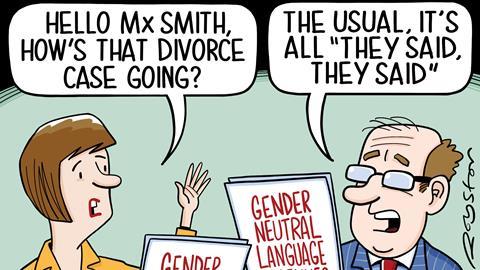
Even though I came into this world in the 1950's I grew up in a denomination and local church (my father as minister) which didn't go in for the "thee, thou and thy" language of an earlier era. In the United Church we didn't have an equivalent of the Anglican Book of Common Prayer and Dad prayed without that formality (or so I recall) and we heard from the Revised Standard Version rather than the King James Version. We were a progressive church which didn't adhere to that sort of formality.
Perhaps that's why a New York Times article entitled What Quakers Can Teach Us About the Politics of Pronouns was an eye-catcher. Pronouns are all the rage these days, to the bewilderment of many. A friend was at an event in the summer where are the participants were asked to introduce themselves by name and pronoun, and because she was asked to go first she needed an explanation. She was a bit surprised that I knew what she was talking about, but as a minister I was aware of the emerging concern about gender inclusive pronouns.
The Times article notes that as early as the 1650's Quakers in England were taking a stand on pronouns as a statement of equality
What set the Quakers apart from other evangelical sects was their rejection of conventional modes of address — above all, their peculiar use of pronouns.In early modern England, the rules of civility dictated that an individual of higher authority or social rank was entitled to refer to himself — and to be referred to by others — with plural, not singular, pronouns. (A trace of this practice survives today in the “royal ‘we.’”) The ubiquitous “you” that English speakers now use as the second-person singular pronoun was back then the plural, while “thee” and “thou” were the second-person singulars.
When Quakerism emerged, proper behavior still required this status-based differentiation. As one early Quaker explained, if a man of lower status came to speak to a wealthy man, “he must you the rich man, but the rich man will thou him.”Quakers refused to follow this practice. They also refused to doff their hats to those of higher social standing. The Quakers’ founder, George Fox, explained that when God sent him forth, “he forbade me to put off my hat to any, high or low; and I was required to thee and thou all men and women, without any respect to rich or poor, great or small.”
I have read Quaker novels in which those archaic (to me) pronouns are used and didn't give a thought to why they are being used. The Times article is much more complex than the excerpt I'm sharing and is worth reading. What it does is nudge us away from reactionary stealth eye-rolling (I've done some) when we're invited to use "they" rather than "he" or "she." Jordan Peterson, a University of Toronto prof, has become an international darling of the right for refusing to use anything but conventional pronouns.
We all need to remember that our conventions aren't universal nor as timeless as we might think. It's also good to be aware that Christians have wrestled with the use of pronouns as a statement of equality and justice for centuries. I may feel too old to engage in a shift, but I just need to wake up to the reality...or is that "woke"?
What do thee think, dear readers?
https://www.nytimes.com/2019/11/16/opinion/sunday/pronouns-quakers.html
No comments:
Post a Comment